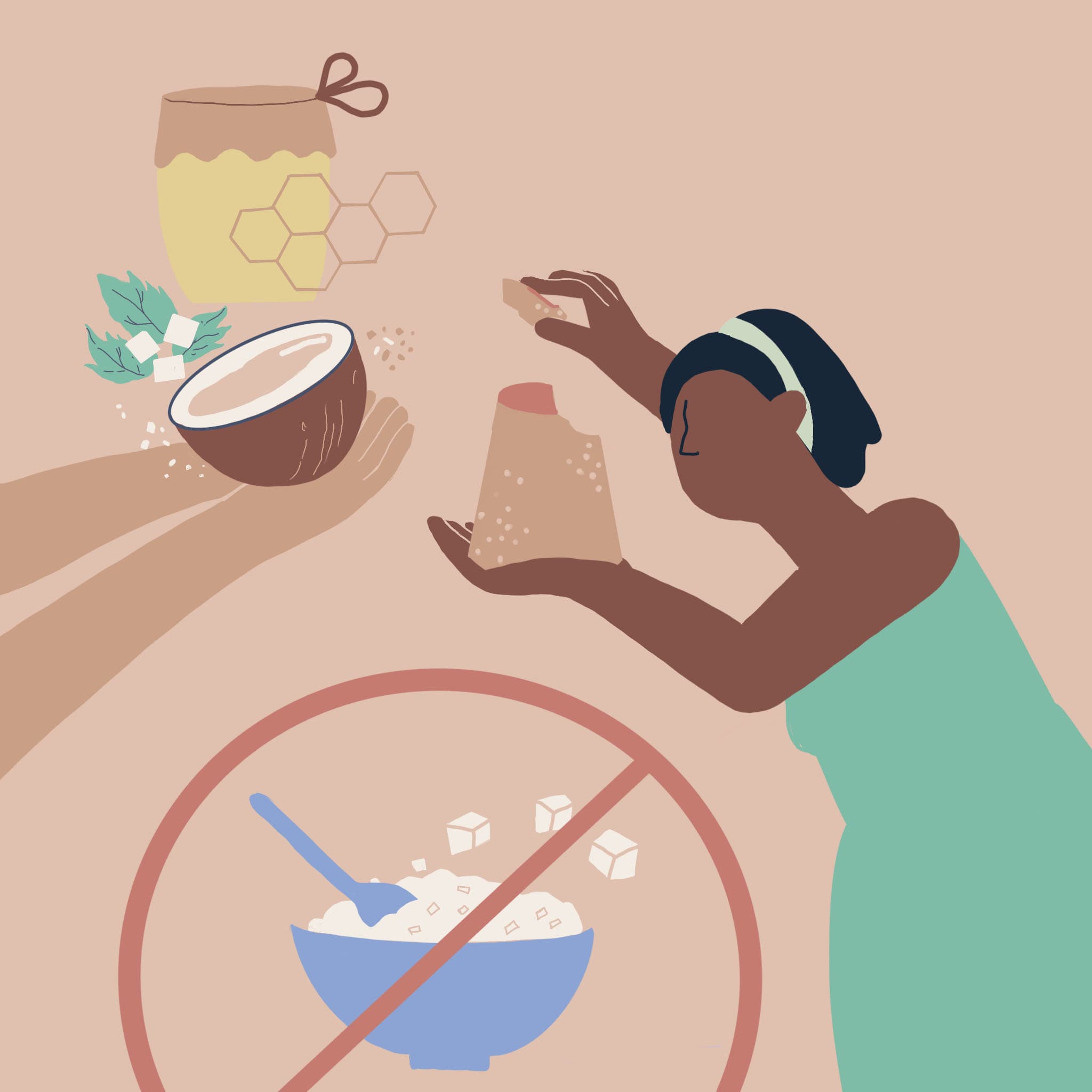We all enjoy sugar in our tea, coffee, dessert, and more! However, it is important to remember that sugar should be consumed in moderation. Restricting sugar intake is particularly significant for older adults. Uncontrolled sugar consumption may cause obesity, type 2 diabetes, and heart disease. It is additionally linked to poor cognitive function, influencing memory and expanding the risk of dementia. Luckily, a wide scope of natural and artificial sugar substitutes and sweeteners are available to help lessen the measure of table sugar in your diet. Cutting down sugar from your diet might not work out for a lot of people. But substituting it with healthier alternatives may help to a great extent! Let us see some of the healthier alternatives of sugar:
1. Stevia extracts
Benefits: Stevia is a plant extract with little-to-no calories. It is a high-intensity novel sweetener that is sweeter than sugar, so you need less of it to provide the same amount of sweetness. It is marketed under brand names like Sugarfree, GAIA Stevia, Organic India Stevia, SteviOcal etc.
Usage: Stevia comes in various forms, including powder and liquid, so you may need to experiment to find out which ones work best in different recipes. Stevia extract is also relatively stable in heat, so it can be used in cakes, sauces, and pastries.
2. Acesulfame potassium
Benefits: As an artificial sweetener, acesulfame potassium (Ace-K) doesn’t cause tooth decay, keeps the blood sugar control, and adds no calories. It is marketed under brand names like Sunsett, and Sweet One.
Usage: Ace-K is also heat-stable and hence, could be used in cooking and baking. It is used in frozen desserts, beverages, candies, and more.
3. Jaggery
Benefits: Jaggery is an Indian natural sweetener. It is prepared from sugarcane. It is possibly the healthiest option to substitute refined sugar. It is good for digestion, asthma, cough, and cold. It has vital nutrients such as minerals and vitamins. It has enough iron, calcium, sodium, magnesium, phosphorus, zinc, and potassium. It is anti-allergic as well. It helps to increase haemoglobin level and improves immunity.
Usage: Jaggery can be used in any and everything. Be it cakes, desserts, beverages, and more. A lot of the Indian population consumes a small amount of jaggery after their meals. It helps in digestion and is a healthy dessert option.
4. Coconut sugar
Benefits: Coconut sugar is an unrefined natural sweetener. So, it retains all its vitamins and minerals and doesn’t lead to fluctuations in blood sugar. However, it is high in carbohydrates and fructose. Hence, people who want to lose weight and who are diabetics should limit it.
Usage: Coconut sugar can be used in the same quantity as white or brown sugar. It has a coarse texture; so, you could grind it to use for baking.
5. Date paste
Benefits: Dates are natural sweeteners. They are rich in fibre, minerals, and vitamins. Date paste is an easy sugar alternative that you can make at home! Simply blend a cup of warm, pitted dates, with 3/4 cup of water and 1/2 teaspoon of vanilla extract.
Usage: Dates can be used in smoothies, baked foods, sauces, and salad dressings. Date paste can be sweeter than sugar, so you’ll have to reduce both the amount you add.
6. Honey
Benefits: Honey is a natural sweetener that contains antioxidants, minerals, and vitamins. It is easier to digest than regular sugar. However, it is high in calories and breaks down to glucose and fructose, so it might not be recommendable for diabetic people.
Usage: Honey is extremely versatile and hence, could be used in smoothies, sauces, baked foods, and salad dressings. It is sweeter than sugar, so you may have to reduce the amount you add.
Quick Tip: To test the quality of honey, mix a tablespoon of honey in a glass of water. If the honey floats on the surface of the water, it has some sugar content added to it. It isn’t good quality honey.

7. Maple syrup
Benefits: Maple syrup is naturally sweet. It is high in antioxidants and rich in minerals, including calcium, zinc, iron, potassium, and manganese. It should, however, be consumed in moderation since it is high in calories.
Usage: Maple Syrup can be used in oatmeal, yogurt, or savoury dishes such as salmon, grilled vegetables, chicken, or salad dressings. You can also use maple syrup when baking — just be mindful of reducing the number of liquids in the recipe.
8. Monk fruit
Benefits: Monk fruit may be a healthy sugar substitute to restrict calories. The FDA says that it is a zero-sugar, zero-calorie sweetener, with no harmful side effects. However, commercially available monk fruit extracts are processed to some extent and may contain other sweeteners, so, be mindful of checking the label.
Usage: If you’re sensitive to an after taste, be cautious when incorporating it into cooking and baking. As with any other high-intensity sweetener, you may need to make alterations to your recipes.
9. Banana Puree
Benefits: Bananas are naturally sweet. They are extremely rich in potassium and fiber. Health experts recommend eating bananas to control high blood pressure.
Usage: You can substitute bananas for about 1 cup of sugar in your recipes. All you have to do is combine 1 cup mashed, overripe bananas, with a few tablespoons of water and make a smooth puree. You can keep adding water until you get the required consistency.
10. Agave nectar
Benefits: Agave is a natural sweetener and is high in calories and contains a lot of fructose which can lead to weight gain and obesity. It may not be a good choice for people with diabetes.
Usage: Due to its long shelf-life Agave and can be used in place of other sweeteners in nearly any cooking situation, especially baking.
11. Aspartame
Benefits: Aspartame is a low-calorie sweetener that is used as a way to lower one’s intake of added sugars while still filling one's cravings for something sweet. It is 200 times sweeter than sugar, so only a small amount of it is needed to match the sweetness provided by sugar. It is marketed under the brand names like Nutrasweet and Equal.
Usage: Aspartame can be used in beverages like diet sodas, light or low-sugar juices etc, dairy products yogurt and low-fat flavoured milk, nutrition bars, desserts like gelatins, sugar-free puddings, light ice cream, chewing gum, sauces, syrups and condiments. It is, however, not well-suited for use in foods that require a long baking time because prolonged exposure to high temperatures can cause it to lose its sweetness.
Final Words
When picking sugar substitutes, it pays to be a clever consumer. Artificial sweeteners and sugar substitutes can assist with weight management. However, they ought to be used in moderation. Food promoted as sugar-free isn't calorie-free, so it can in any case cause weight gain. Always read labels before you buy packaged foods. You might find names such as - beet sugar, blackstrap molasses, brown sugar, grape sugar, rapadura and more, on the labels of the packed foods. Be mindful of what you buy! Remember that processed foods, which regularly contain sugar substitutes, for the most part, don't offer similar health benefits as whole foods, like fruits and vegetables.
Disclaimer: This information is educational and should not be construed as medical advice. Please consult your doctor before making any dietary changes or adding supplements.
Proactive For Her is a digital clinic for women, offering accessible, personalised, and confidential healthcare solutions. We offer out-patient care, diagnostic services and programs for various health concerns of Indian women, across their lifetime - from puberty to pregnancy to menopause.

